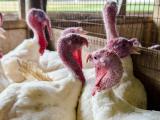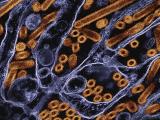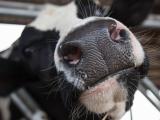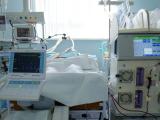Apr 23, 2013 (CIDRAP News) – Infections with the novel H7N9 avian flu virus have hospitalized three more people in China, with one additional fatality reported, nudging the overall total to 108 cases and 22 deaths.
All of the newly reported cases are in older men from eastern China, according to an update today from the World Health Organization (WHO).
Two are from Zhejiang province, an 84-year-old and a 62-year-old who both started having symptoms on Apr 15.
The third patient is from Anhui province, a 91-year-old man who became ill on Apr 14.
An update today from Hong Kong's Centre for Health Protection (CHP) said the two patients from Zhejiang province are in critical condition, while the man from Anhui province is in serious condition.
The WHO said the latest death is in a patient from Zhejiang province whose illness was reported earlier.
Today's totals from the WHO and CHP include a 36-year-old man from Shandong province whose H7N9 infection was first announced by provincial officials and picked up by the media yesterday. His lab findings have now been confirmed by the China Center for Disease Control and Prevention (China CDC). His illness was Shandong province's first confirmed case.
Health officials in Shanghai held a briefing yesterday to update the media on a 2-day visit to the city by a joint WHO mission to explore how the disease is spreading and how local officials are responding to the threat, China Daily reported today. The group, which included several international influenza experts, visited public health offices, an animal health agency, and a live-poultry market, though reportedly all of the city's poultry markets have been closed.
Keiji Fukuda, MD, the WHO's assistant director-general for health security and environment, said the joint mission members are impressed by their discussions with Shanghai officials and the city's response to the disease, the Daily reported. So far there is no sign of sustained human-to-human transmission, he said.
During the media briefing the daughter of a Shanghai woman and man who were both infected with the virus, her mother fatally, spoke out and requested that her 56-year-old father, who is still hospitalized, receive convalescent serum therapy, according the report. She told the Daily that a Shanghai health official told her after the briefing that the serum can't be used clinically.
In other developments, Chinese officials recently submitted more human and animal genetic sequences of the H7N9 virus to the GISAID database, according to Apr 21 and 22 Twitter posts from GISAID AI Digest.
Sequences from human cases were deposited by Hangzhou health officials in Zhejiang province. The animal sequences are from two poultry detections in Jiangsu province.
See also:
Apr 23 WHO update
Apr 23 CHP update
Apr 23 China Daily story
GISAID AI Digest Twitter feed




















